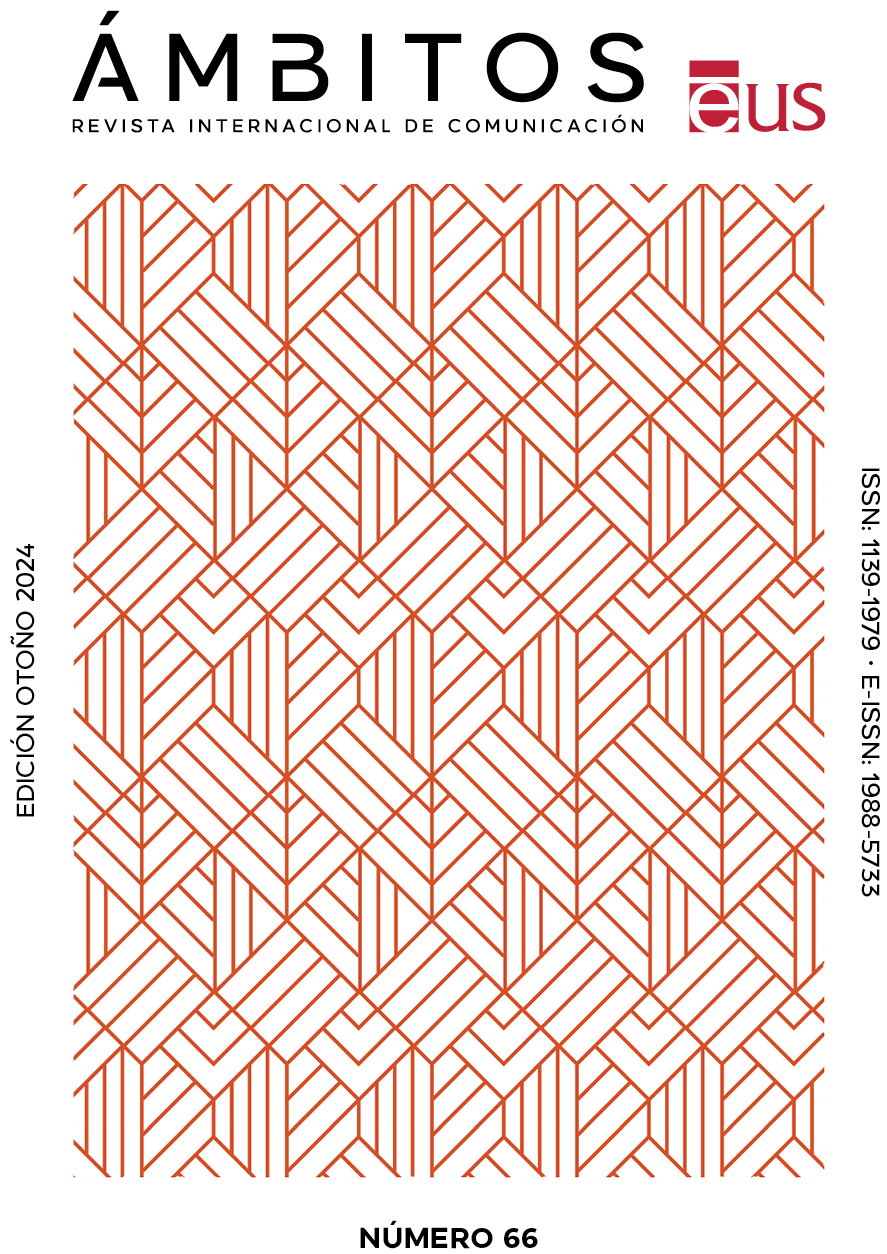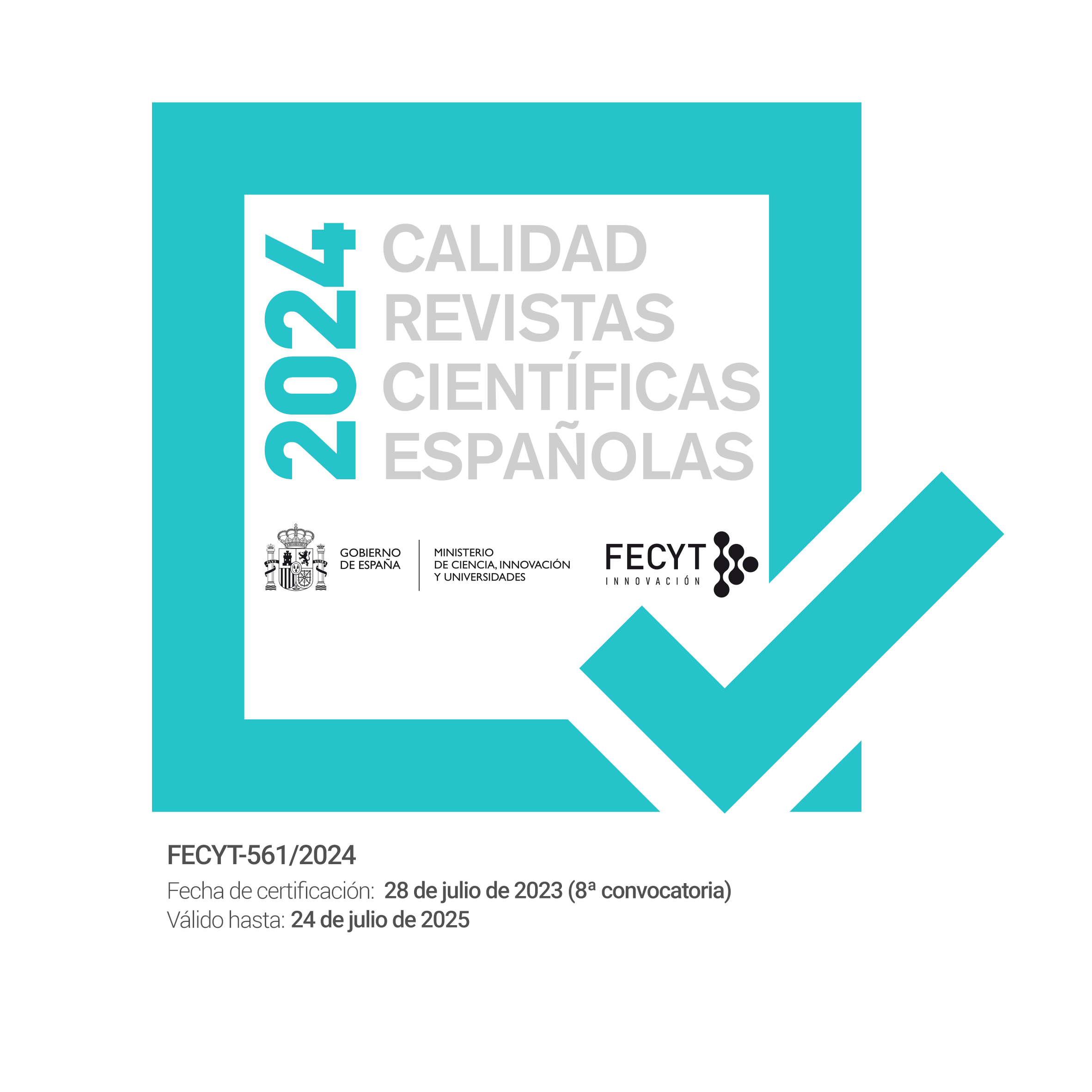Propuesta de un código de buenas prácticas para el tratamiento informativo sobre la Unión Europea en medios locales
DOI:
https://doi.org/10.12795/Ambitos.2024.i66.01Palabras clave:
periodismo local, información de calidad, transferencia, buenas prácticas, Unión EuropeaResumen
La Unión Europea (UE) constituye un actor político de máxima influencia en el territorio de las diferentes áreas locales europeas. Sin embargo, la relevancia de las instituciones comunitarias no ha venido acompañada tradicionalmente de coberturas informativas acordes, especialmente a escala local y regional, lo que ahonda en la existencia de un déficit democrático y comunicativo. Teniendo en cuenta la intrínseca función social de los medios de proximidad y el concepto de periodismo de calidad, el presente manuscrito aborda la construcción de un decálogo de recomendaciones mediante una estrategia de investigación mixta sobre estudios de casos en medios locales, combinando entrevistas semiestructuradas y análisis de contenido. El objetivo es proporcionar una herramienta analítica de buenas prácticas, que permita evaluar la calidad del tratamiento mediático del proyecto europeo y sirva a la vez como instrumento de transferencia. A partir de resultados prácticos sobre la escasez y fragmentación de la información europea, la propuesta actual define ocho variables sobre las que actuar, considerando la colisión entre la autovaloración positiva de los periodistas y las prácticas escasamente especializadas en torno a la UE. Nuestra principal contribución se orienta a la posibilidad de analizar y mejorar la pertinencia de los contenidos periodísticos locales, de acuerdo con la pretensión de construir una comunidad de ciudadanos debidamente informada acerca del proyecto europeo. El índice de buenas prácticas sugerido conforma así un modelo ideal para el desarrollo comunicativo de la Esfera Pública Europea.
Descargas
Citas
Anderson, P. J., Ogola, G., & Williams, M. (2013). The Future of Quality News Journalism: A Cross-Continental Analysis. Routledge.
Baisnée, O. (2014). Reporting the European Union: A Study in Journalistic Boredom. En R. Kuhn, & R. K. Nielsen (Eds.), Political journalism in transition: Western Europe in a comparative perspective (pp. 131-149). I.B. Tauris.
Berganza-Conde, R. (2008). Medios de comunicación, “espiral del cinismo” y desconfianza política. Estudio de caso de la cobertura mediática de los comicios electorales europeos. ZER-Revista de estudios de comunicación, 13(25), 121-139. https://bit.ly/3UXPKd6
Bijsmans, P., & Altides, C. (2007). ‘Bridging the Gap’ between EU Politics and Citizens? The European Commission, National Media and EU Affairs in the Public Sphere. European Integration, 29(3), 323-340. https://doi.org/10.1080/07036330701442315
Braun, V., & Clarke, V. (2006). Using thematic analysis in psychology. Qualitative research in psychology, 3(2), 77-101. https://doi.org/10.1191/1478088706qp063oa
Caiani, M., & Guerra, S. (2017). Euroscepticism, Democracy and the Media: Communicating Europe, Contesting Europe. Palgrave Macmillan.
Carson, A., Muller, D., Martin, J., & Simons, M. (2016). A new symbiosis? Opportunities and challenges to hyperlocal journalism in the digital age. Media International Australia, 161(1), 132-146. https://doi.org/10.1177/1329878X16648390
Chaparro, M., Olmedo, S., & Gabilondo, V. (2016). El indicador de Rentabilidad Social en Comunicación (IRSCOM): medir para transformar. CIC. Cuadernos de Información y Comunicación, (21), 47-62. https://doi.org/10.5209/CIYC.52944
de Vries, C. (2018). Euroscepticism and the Future of European Integration. Oxford University Press.
Fernández-Barrero, Á., Rivas-de-Roca, R., & Pérez-Curiel, C. (2024). Disinformation and Local Media in the Iberian Context: How to Protect News Credibility. Journalism and Media, 5(1), 65-77. https://doi.org/10.3390/journalmedia5010005
Frangonikolopoulos, C. A., & Papapadopoulou, L. (2021). Greek Correspondents and EU: Organic Critiques and Proposed Remedies to Address EU’s Communication Deficit. Journalism Practice, 15(8), 1108-1128. https://doi.org/10.1080/17512786.2020.1772854
Gattermann, K. (2018). Mediated Personalization of Executive European Union Politics: Examining Patterns in the Broadsheet Coverage of the European Commission, 1992-2016. The International Journal of Press/Politics, 23(3), 345-366. https://doi.org/10.1177/1940161218779231
Goldberg, A. C., Brosius, A., & de-Vreese, C. H. (2022). Policy responsibility in the multilevel EU structure – The (non-)effect of media reporting on citizens’ responsibility attribution across four policy areas. Journal of European Integration, 44(3), 381-409. https://doi.org/10.1080/07036337.2020.1863959
Hallin, D. C., & Mancini, P. (2004). Comparing Media Systems: Three Models of Media and Politics. Cambridge University Press.
Handstein, H. (2010). Qualität im lokalen Zeitungsjournalismus. Theoretischer Entwurf und empirische Fallstudie. AVM Akademische Verlagsgemeinschaft.
Hanitzsch, T. (2007). Deconstructing Journalism Culture: Toward a Universal Theory. Communication Theory, (17), 367-385. https://doi.org/10.1111/j.1468-2885.2007.00303.x
Hanusch, F. (2015). A Different Breed Altogether? Distinctions between Local and Metropolitan Journalism Cultures. Journalism Studies, 16(6), 816-833. https://doi.org/10.1080/1461670X.2014.950880
Henkel, I., Thurman, N., & Deffner, V. (2019). Comparing Journalism Cultures in Britain and Germany: Confrontation, Contextualization, Conformity. Journalism Studies, 20(14), 1995-2013. https://doi.org./10.1080/1461670X.2018.1551067
Hess, K., & Waller, L. (2017). Local journalism in a digital world. Palgrave MacMillan.
Humprecht, E., Castro-Herrero, L., Blassnig, S., Brüggemann, M., & Engesser, S. (2022). Media systems in the digital age: An empirical comparison of 30 countries. Journal of Communication, 72(2), 145-164. https://doi.org/10.1093/joc/jqab054
Jackson, D., Thorsen, E., & Wring, D. (Eds.) (2016). EU Referendum Analysis 2016: Media, Voters and the Campaign. The Centre for the Study of Journalism Culture and Community Bournemouth University. https://bit.ly/3UZEAVp
Jandura, O., & Friedrich, K. (2014). The quality of political media coverage. En C. Reinemann (Ed.), Handbook of Communication Science: Political Communication (pp. 351-373). De Gruyter Mouton.
Jenkins, J., & Graves, L. (2022). Do More with Less: Minimizing Competitive Tensions in Collaborative Local Journalism. Digital Journalism, first online. https://doi.org/10.1080/21670811.2022.2026237
Jenkins, J., & Nielsen, R. K. (2020). Proximity, Public Service, and Popularity: A Comparative Study of How Local Journalists View Quality News. Journalism Studies, 21(2), 236-253. https://doi.org/10.1080/1461670X.2019.1636704
Jensen, K. B. (Ed.) (2020). A handbook of media and communication research: qualitative and quantitative methodologies (3rd ed.). Routledge. https://doi.org/10.4324/9781138492905
Jerónimo, P., Correia, J. C., & Gradim, A. (2022). Are We Close Enough? Digital Challenges to Local Journalists. Journalism Practice, 16(5), 813-827. https://doi.org/10.1080/17512786.2020.1818607
Lecheler, S., Gattermann, K., & Aaldering, L. (2023). Disinformation and the Brussels bubble: EU correspondents’ concerns and competences in a digital age. Journalism, 0(0). https://doi.org/10.1177/14648849231188259
Lloyd, J., & Marconi, C. (2014). Reporting the EU: News, media and the European institutions. I.B. Tauris.
Masini, A., Van-Aelst, P., Zerback, T., Reinemann, C., Mancini, P., Mazzoni, M, Damiani, M., & Coen, S. (2018). Measuring and Explaining the Diversity of Voices and Viewpoints in the News. Journalism Studies, 19(15), 2324-2343. https://doi.org/10.1080/1461670X.2017.1343650
Morlandstø, L., & Mathisen, B. R. (2023). Blind spots and diversity in a local media landscape. Journalism, 24(12), 2575-2592. https://doi.org/10.1177/14648849221119603
Napoli, P. M., Stonbely, S., McCollough, K., & Renninger, B. (2019). Local Journalism and the Information Needs of Local Communities: Toward a Scalable Assessment Approach. Journalism Practice, 13(8), 1024-1028. https://doi.org/10.1080/17512786.2019.1647110
Neff, T., & Pickard, V. (2023). Building Better Local Media Systems: A Comparative Policy Discourse Analysis of Initiatives to Renew Journalism Around the World. Journalism Studies, 24(15), 1877-1897. https://doi.org/10.1080/1461670X.2023.2253928
Negreira-Rey, M., Vázquez-Herrero, J., & López-García, X. (2023). No People, No News: News Deserts and Areas at Risk in Spain. Media and Communication, 11(3), 293-303. https://doi.org/10.17645/mac.v11i3.6727
Nielsen, R. K. (2015). Local Newspapers as Keystone Media: The Increased Importance of Diminished Newspapers for Local Political Information Environments. En R. K. Nielsen (Ed.), Local Journalism: the decline of newspapers and the rise of digital media (pp. 51-72). I.B. Tauris.
Nienstedt, H.-W., Kepplinger, H. M., & Quiring, O. (2015). What Went Wrong and Why? Roots, Responsibilities, and Solutions of the Euro Crisis in European Newspapers. En R. G. Picard (Ed.), The Euro Crisis in the Media: Journalistic Coverage of Economic Crisis and European Institutions (pp. 19-44). I. B. Tauris.
Risse, T. (2015). European Public Spheres: Politics Is Back. Cambridge University Press.
Rivas-de-Roca, R. (2022). Calidad y modelos de negocio en los medios de proximidad. Estudio de casos en Alemania, España y Portugal. Estudos em Comunicacão, (34), 81-96. https://doi.org/10.25768/1646-4979n34-07
Rivas-de-Roca, R., García-Gordillo, M., & Caro-González F. J. (2023). Calidad e información local: propuesta de construcción de indicadores internacionales. En D. Palau-Sampio, J. F. Gutiérrez Lozano, & M. García-Gordillo (Eds.), Calidad periodística. Retos en tiempos de desinformación, precariedad y polarización (pp. 73-87). Comunicación Social Ediciones y Publicaciones.
Romero-Rodríguez, L. M., De-Casas-Moreno, P., & Torres-Toukoumidis, Á. (2016). Dimensiones e indicadores de la calidad informativa en los medios digitales. Comunicar, (49), 91-100. https://doi.org/10.3916/C49-2016-09
Seoane Pérez, F. (2013). Political Communication in Europe: The Cultural and Structural Limits of the European Public Sphere. Palgrave Macmillan.
Shah, D. V. (2016). Conversation is the soul of democracy: Expression effects, communication mediation, and digital media. Communication and the Public, 1(1), 12-18. https://doi.org/10.1177/2057047316628310
Splendore, S., & Curini, L. (2020). Proximity Between Citizens and Journalists as a Determinant of Trust in the Media. An Application to Italy. Journalism Studies, 21(9), 1167-1185. https://doi.org/10.1080/1461670X.2020.1725601
Tuñón-Navarro, J., & Bouza-García, L. (Eds.) (2021). Europa en tiempos de desinformación y pandemia: periodismo y política paneuropeos ante la crisis del Covid-19 y las fake news. Comares.
Tuñón-Navarro, J., Oleart, Á., & Bouza-García, L. (2019). Actores Europeos y Desinformación: la disputa entre el factchecking, las agendas alternativas y la geopolítica. Revista de Comunicación, 18(2), 245-260. https://doi.org/10.26441/RC18.2-2019-A12
Usher, N., & Kim-Leffingwell, S. (2023). How Loud Does the Watchdog Bark? A Reconsideration of Losing Local Journalism, News Nonprofits, and Political Corruption. The International Journal of Press/Politics, 0(0). https://doi.org/10.1177/19401612231186939
Uth, B. (2024). The quality oriented, the audience engagers, the transparent: Types of editorial trust-building in German news outlets. Journalism, 25(2), 391-408. https://doi.org/10.1177/14648849221141522
van-Spanje, J., & de-Vreese, C. (2014). Europhile Media and Eurosceptic Voting: Effects of News Media Coverage on Eurosceptic Voting in the 2009 European Parliament. Political Communication, 31(2), 325-354. https://doi.org/10.1080/10584609.2013.828137
Zurbano-Berenguer, B., & García-Gordillo, M. (2017). Propuesta metodológica para la evaluación de la calidad deontológica de las noticias sobre violencias contra las mujeres. Communication & Society, 30(1), 73-85. https://doi.org/10.15581/003.30.1.73-85
Publicado
Cómo citar
Número
Sección
Licencia
Derechos de autor 2024 Rubén Rivas-de-Roca, Mar García-Gordillo

Esta obra está bajo una licencia internacional Creative Commons Atribución-NoComercial-CompartirIgual 4.0.
Ámbitos. Revista Internacional de Comunicación es una revista de acceso abierto, lo que significa que todo su contenido está disponible gratuitamente para el usuario o su institución. Los usuarios pueden leer, descargar, copiar, distribuir, imprimir, buscar o enlazar con el texto completo de los artículos, o utilizarlos para cualquier otro fin lícito, sin solicitar permiso previo al editor o al autor. Esta definición de acceso abierto se ajusta a la Iniciativa de Acceso Abierto de Budapest (BOAI).

A menos que se indique lo contrario, todo el contenido de la edición electrónica se distribuye bajo una " licencia internacional Creative Commons Attribution-NonCommercial-ShareAlike 4.0 ". Puede consultar la versión informativa y el texto legal de la licencia aquí. Esto debe indicarse expresamente de esta manera cuando sea necesario.
En caso de aceptación del manuscrito, los autores ceden los derechos de la obra para su publicación a Ámbitos. Revista Internacional de Comunicación bajo el contrato de licencia Reconocimiento-NoComercial-CompartirIgual 4.0 Internacional (CC BY-NC-SA 4.0). Los autores conservan los derechos de autor y terceros están autorizados a copiar, distribuir y hacer uso de la obra, siempre que cumplan con los términos y condiciones establecidos en la licencia.
- Citar la autoría y la fuente original de publicación (revista, editorial y URL de la obra).
- No los utilice con fines comerciales.
- Si remezcla, transforma o crea a partir del material, debe publicar sus contribuciones bajo la misma licencia que el original.
Se puede encontrar más información en https://creativecommons.org/licenses/by-nc-sa/4.0/deed.es



















